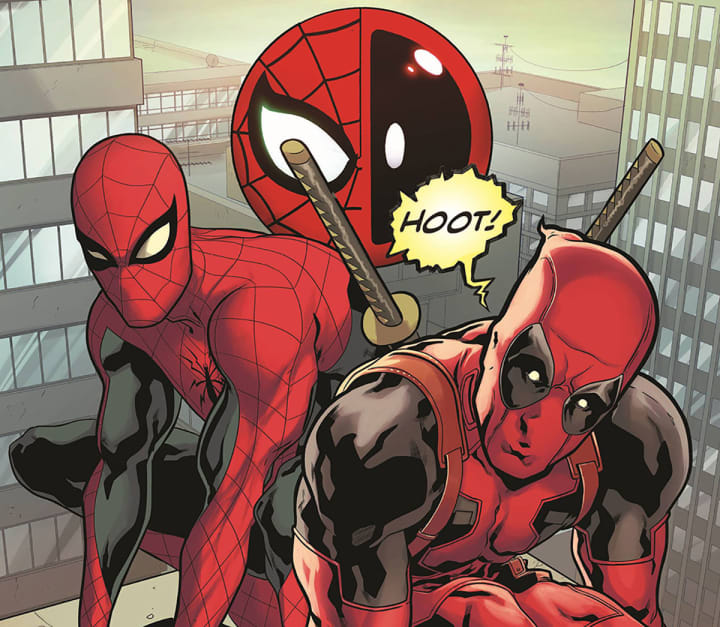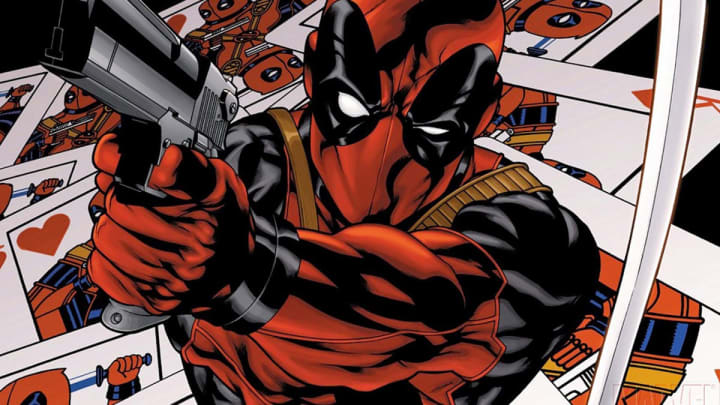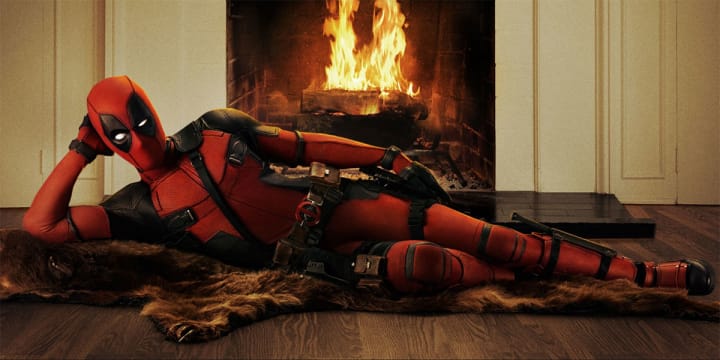History of Deadpool
Learn the real history of Deadpool, everyone's favorite merc with a mouth.
Captain America is as American as apple pie and hand guns. Captain America is the favorite superhero of every goody two-shoes out there. Yet for those that are a little more badass, Captain America is nothing compared to antihero Deadpool. Born as Wade Winston Wilson, he is a normal person with a highly dysfunctional family who was once a volunteer test subject of the Weapon X program. You might ask yourself, did he really volunteer? But, when you have cancer, and the government promised to give you a regenerative healing factor, then it must sound like a good idea. I mean, not to any sane person, but when you are wild and mentally unstable like Wade, sure. Deadpool's powers and personality traits combine to make him an unpredictable mercenary, the merc with a mouf. M-O-U-F. Two fists, two swords, four guns, and a number of other weapons that seem to appear from his "magic satchel." In other words, a total badass.
Plus, since he is basically 4chan in superhero form, Deadpool is infamous for breaking the fourth wall, the imaginary "wall" that separates the audience from the world of the comic, and acknowledging the viewer. This has turned him into a super star in the comic world, and one of the funniest heroes ever created. The self-professed member of the X-Men and Avengers comes with a litany of awesomely hilarious quips. After the success of Deadpool's 2016 movie, it's time that those not familiar with his comics learn a bit more about his history.
History of the Merc with the Mouth
Everyone loves him. That much is undeniable at this point. His movie in February 2016 broke so many records that the film industry literally has no idea what to do with the new information. We’re either going to see a lot more comic book movies in the future (which was going to happen anyways), or we’re going to be seeing a lot more R-rated comic book movies. Whatever the future holds, the fact remains that Deadpool started it all. So the question is, who is Deadpool? How did he become so popular?
Deadpool has particularly humble beginnings, appearing in a copy of The New Mutants #98 where he had a relatively minor role. He was given the name Wade Wilson as a direct reference to DC’s famous mercenary character Deathstroke whose name was Slade Wilson. Although the creators Rob Liefield and Fabian Nicieza may not have known it then, this fourth wall jab would come to define the character as the years went on.

Photo via Marvel Wiki
Deadpool's Inspiration
In fact, the creation of Deadpool can be tracked to lots of different established characters. One such character was Spiderman. Not only in the costume similarities, but also in the fact that Spiderman would crack jokes as he fought in the comics. This was something that Liefield and Nicieza loved in the character and wanted to emulate. Thus, Deadpool. Deadpool’s supporting cast was also influenced by other characters in the Marvel universe. Cable was meant to be their version of Wolverine, and Domino was meant to be their version of Elektra.
When Deadpool first appeared, he was hired by a character named Tolliver to assault Cable and the New Mutants. This also came to define the character. Deadpool has a very loose moral structure at best and would do pretty much anything for some cash. After this appearance he made guest appearances in the X-Force as a fairly popular recurring character as well as guest starring in several other series. In fact, he actually managed to make it into Marvel’s most popular comics in the form of guest appearances in The Avengers and Daredevil.

Photo via Total Comic Mayhem
Deadpool Comes Into His Own
But it was in 1993 that Deadpool got his first shot to come into his own when he received a mini series called The Circle Chase, which was written by the original writer of Deadpool's comics, Fabian Nicieza but drawn by Hoe Madureira. It surprised Marvel with its relatively positive reception and success and so a second miniseries was commissioned to be released in 1994 by a different writer, Mark Waid. Waid later commented, "Frankly, if I'd known Deadpool was such a creep when I agreed to write the mini-series, I wouldn't have done it. Someone who hasn't paid for their crimes presents a problem for me.” In a strange way, Deadpool was beginning to represent a less binary morality system in popular comic culture. He did bad things and was never punished. In fact, more often than not, he was rewarded for it.
Then in 1997 Marvel took the plunge and let Deadpool have his own solo series. This was a pretty big gamble on their part. Although Deadpool had been met with positive reception over the 90s, that did not mean that his own series would be any good, and the investment could be a bust, especially on a character that wasn’t particularly, for lack of a better term, normal.
But it paid off, and it paid off well. Deadpool morphed into an action comedy parody of the cosmic drama, antihero-heavy comics of the time. The series firmly established his supporting cast, including his prisoner/den mother Blind Al and his best friend Weasel. The ongoing series gained cult popularity for its unorthodox main character and its balance of angst and pop culture slapstick and the character became less of a villain, though the element of his moral ambiguity remained.
Many were uncomfortable with this, especially comic die hards, but writer Joe Kelly notes, "With Deadpool, we could do anything we wanted because everybody just expected the book to be cancelled every five seconds, so nobody was paying attention. And we could get away with it." This could be part of the reason that the fourth wall breaking story element was created. That’s the thing about art, sometimes it’s impossible to create it in an intentional manner. In a way, Deadpool was defined by the negligence that Marvel showed it.

Photo via Griddaily
Deadpool Evolves
Deadpool lasted until issue #69, at which point it was relaunched into something that wasn’t truly Deadpool. Throughout the 2000s Deadpool appeared alongside his sometimes enemy, sometimes friend Cable. The two characters came to represent a twisted form of the buddy cop genre. Deadpool played the wacky, happy-go-lucky character who’s wacky antics and nihilistic attitude towards life would often get the two in trouble. Cable, on the other hand, was very much the straight man, a badass in every sense of the word, but overly stoic. Cable would frequently get incredibly annoyed by Deadpool and vice versa, and it was this bickering that became so popular with readers.
Deadpool's Other Comic Appearances
Deadpool by this point had become a mainstay character in the Marvel universe and appeared in a wide variety of places and contributing greatly to the overarching storyline of the entire canon universe. He was a character that was very much championed by the audience and you can tell that sometimes the writers weren’t really sure what to do with him. He’s immortal. He knows he’s a comic book character and he doesn’t care at all.
Deadpool also got a second miniseries dedicated to himself called, Deadpool Kills the Marvel Universe, which is exactly what it sounds like. The writers take his immortality to the extreme as we see Deadpool systematically take down every superhero and villain, as well as the writers of the very comic he’s in. I like to see Deadpool as a protest against the binary morality of comics in the early 90s and late 80s. He’s a rule breaker and he couldn’t care any less, and there’s something so utterly endearing about this dedicated anarchism that you can’t help but root for him a little bit.
About the Creator
Stephen Hamilton
Definitive movie buff. Quickly realized that it was more financially prudent to write about film than trying to beg for millions of dollars to make his own.





Comments
There are no comments for this story
Be the first to respond and start the conversation.